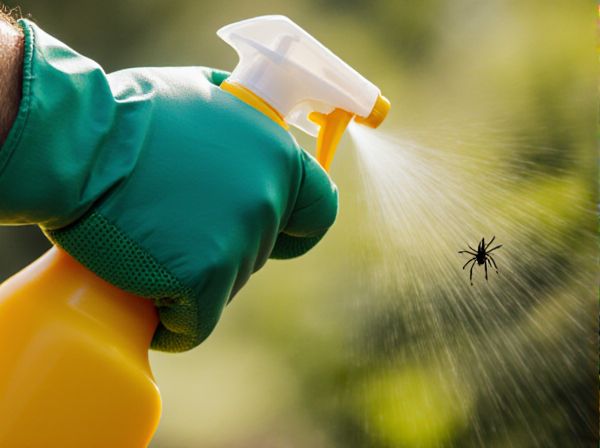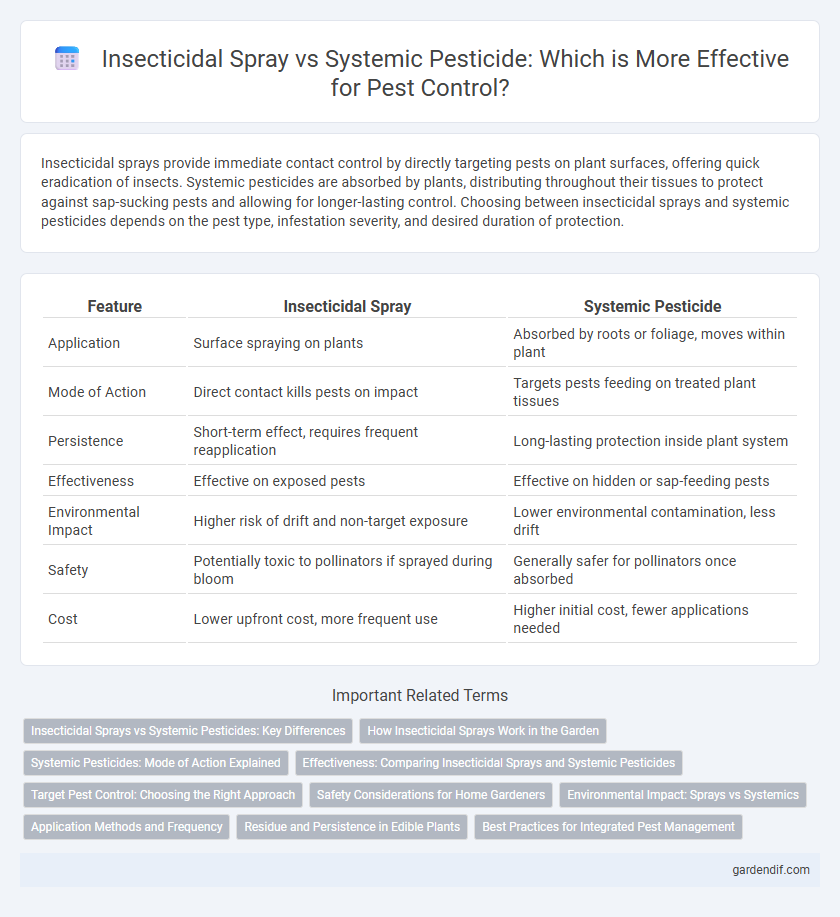
Insecticidal spray vs Systemic pesticide Illustration
Insecticidal sprays provide immediate contact control by directly targeting pests on plant surfaces, offering quick eradication of insects. Systemic pesticides are absorbed by plants, distributing throughout their tissues to protect against sap-sucking pests and allowing for longer-lasting control. Choosing between insecticidal sprays and systemic pesticides depends on the pest type, infestation severity, and desired duration of protection.
Table of Comparison
| Feature | Insecticidal Spray | Systemic Pesticide |
|---|---|---|
| Application | Surface spraying on plants | Absorbed by roots or foliage, moves within plant |
| Mode of Action | Direct contact kills pests on impact | Targets pests feeding on treated plant tissues |
| Persistence | Short-term effect, requires frequent reapplication | Long-lasting protection inside plant system |
| Effectiveness | Effective on exposed pests | Effective on hidden or sap-feeding pests |
| Environmental Impact | Higher risk of drift and non-target exposure | Lower environmental contamination, less drift |
| Safety | Potentially toxic to pollinators if sprayed during bloom | Generally safer for pollinators once absorbed |
| Cost | Lower upfront cost, more frequent use | Higher initial cost, fewer applications needed |
Insecticidal Sprays vs Systemic Pesticides: Key Differences
Insecticidal sprays target pests directly on contact, providing immediate knockdown effects but often require frequent reapplication due to environmental degradation. Systemic pesticides are absorbed by plants and translocated through their tissues, offering prolonged protection against internal and sap-sucking insects. While insecticidal sprays control a broad spectrum of pests externally, systemic pesticides are more effective for managing hidden or feeding pests within plant structures.
How Insecticidal Sprays Work in the Garden
Insecticidal sprays work by directly contacting pests on plant surfaces, delivering immediate knockdown effects through chemical agents that disrupt insect nerve function or cellular processes. These sprays coat leaves and stems, providing a barrier that kills or repels insects upon exposure, making them effective against a broad range of garden pests. Unlike systemic pesticides, which are absorbed and distributed throughout the plant, insecticidal sprays act externally and need reapplication after rain or new growth.
Systemic Pesticides: Mode of Action Explained
Systemic pesticides are absorbed by plants and transported through their vascular system, targeting pests that feed on leaves, stems, or roots. Unlike insecticidal sprays that act on contact, systemic pesticides offer long-lasting protection by poisoning insects internally after ingestion. This mode of action ensures effective control of sap-sucking pests such as aphids, whiteflies, and beetles, reducing the need for frequent applications and minimizing environmental impact.
Effectiveness: Comparing Insecticidal Sprays and Systemic Pesticides
Insecticidal sprays provide immediate contact action, rapidly eliminating visible pests on plant surfaces, but may require frequent applications due to limited residual effects. Systemic pesticides absorb into plant tissues, offering prolonged protection by targeting pests that feed on the plant's sap or internal structures, resulting in enhanced control over hard-to-reach insects. Effectiveness varies with pest type and infestation severity, making systemic pesticides generally more efficient for sustained pest management while sprays excel in acute outbreaks.
Target Pest Control: Choosing the Right Approach
Insecticidal sprays provide immediate contact control, effectively targeting surface-dwelling pests like aphids and whiteflies with rapid knockdown results. Systemic pesticides work by being absorbed through plant tissues, offering prolonged protection against sap-sucking insects such as mealybugs and scale insects by disrupting their feeding. Selecting between these methods depends on the pest species, infestation severity, and desired duration of control to maximize efficacy and minimize environmental impact.
Safety Considerations for Home Gardeners
Insecticidal sprays provide immediate pest control by directly targeting insects on contact, but they may pose higher risks of exposure to humans and pets due to surface residues. Systemic pesticides are absorbed by plants and protect from pests internally, reducing direct contact hazards but requiring careful adherence to application guidelines to avoid phytotoxicity or contamination. Home gardeners should prioritize product safety labels, use personal protective equipment, and consider environmental impact when choosing between sprays and systemic treatments.
Environmental Impact: Sprays vs Systemics
Insecticidal sprays often result in greater environmental contamination due to their broad-spectrum action and potential to drift, affecting non-target organisms and pollinators. Systemic pesticides, absorbed by plants and distributed internally, reduce surface residue and exposure but can accumulate in pollen and nectar, posing risks to beneficial insects like bees. Evaluating environmental impact requires considering persistence, bioaccumulation, and effects on ecosystem biodiversity within the context of application methods.
Application Methods and Frequency
Insecticidal sprays are applied directly to the pest or plant surface, requiring frequent reapplication due to degradation by weather and exposure. Systemic pesticides are absorbed by the plant and distributed internally, providing longer-lasting protection with fewer applications. The choice between spray and systemic methods depends on pest type, crop, and environmental factors influencing application efficiency and frequency.
Residue and Persistence in Edible Plants
Insecticidal sprays often leave surface residues that degrade quickly under sunlight and rain, reducing their persistence on edible plants. Systemic pesticides are absorbed and translocated within plants, resulting in longer-lasting internal residues that can persist through harvest and consumption. Understanding residue behavior and persistence is critical for ensuring food safety and compliance with residue limits in edible crops.
Best Practices for Integrated Pest Management
Insecticidal sprays provide immediate control by targeting pests on contact but may require repeated applications due to limited residual activity. Systemic pesticides are absorbed by plants and provide extended protection by affecting pests that feed internally, enhancing effectiveness in integrated pest management (IPM) programs. Combining both methods with monitoring and natural predator conservation optimizes pest control while minimizing environmental impact and resistance development.
Insecticidal spray vs Systemic pesticide Infographic

 gardendif.com
gardendif.com